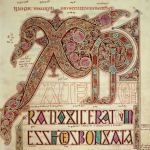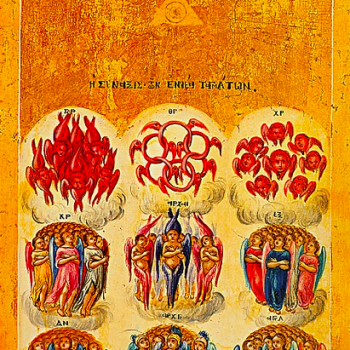I decided to do something a little unusual for this post, picking up the epistle instead of the Gospel, and the alternate choice of epistle too. This is partly because I like doing this for solemnities, and partly because this passage has an interesting contribution to make to our understanding of the Old Testament.

Ascension of Christ by Adriaen van Overbeke
(c. 1510s), a painting which I cannot help
but find very, very funny.
Ephesians 4.1-13, RSV-CE
I therefore, a prisonerc fora the Lord, beg you to lead a lifeb worthy of the calling to which you have been called, with all lowliness and meekness, with patience, forbearing one another in love, eager to maintain the unity of the Spirit in the bondc of peace. There is one bodyd and one Spirit, just as you were called to the one hope that belongs to your call, one Lord, one faith, one baptism,e one God and Father of us all, who is above all and through all and in all. But grace was given to each of us according to the measure of Christ’s gift.f Therefore it is said,
“When he ascended on high he led a host of captives,
and he gave giftsf to men.”
(In saying, “He ascended,” what does it mean but that he had also descended into the lower parts of the earth? He who descended is he who also ascended far above all the heavens, that he might fill all things.) And his gifts were that someg should be apostles,h someg prophets, someg evangelists, someg pastorsi and teachers, for the equipment of the saints, for the work of ministry, for building up the body of Christ, until we all attain to the unity of the faith and of the knowledge of the Son of God, to maturej manhood, to the measure of the staturej of the fulness of Christ.
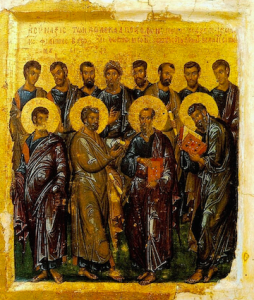
Ephesians 4.1-13, my translation
So I, a prisonerc ina the Lord, call on you to walkb worthily of the calling you were called with, in all littleness of spirit and gentleness, with long tempers, in charity holding nothing against one another, hastening to look to unity of spirit in the bondc of peace; one bodyd and one spirit, just as you were also called in one hope of your calling: one Lord; one belief; one immersione; one God and Father of all, who is upon all and through all and among all. To each one of us, grace was given, according to the measure of the giftf of the Anointed. Because it says:
“Going up on high, he took captivity captive;
he gave awardsf to men.”
And this “He went up”—what is it, if not that he also went down into the lower part of the earth? It is he who goes down and goes up above all the heavens, in order that he might fill all things. And he gave theseg as emissariesh and thoseg as prophets, theseg as bringers of good news and thoseg as shepherdsi and teachers, for the preparation of the holy ones for the work of service, for the construction of the body of the Anointed, until we all attain to the unity of belief and of the knowledge of the Son of God, to a finishedj man, to the measure of agej of the fullness of the Anointed.
Textual Notes
I’ve left out a few terms and differences that I would normally note here, for brevity’s sake—e.g., my decision to translate “Christ” (= “Anointed”) or my use of “belief” instead of “faith.” Note that there are multiple instances in this passage in which the same note applies to multiple words of the text.
a. for/in: I’m frankly puzzled by the RSV’s decision to change the preposition here; the text plainly says ἐν [en], “in” (unless there’s a textual variant here not marked in the Greek I was using, or one that was marked and I didn’t notice).
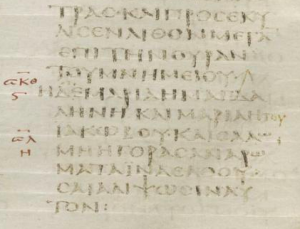
b. lead a life/walk: The still-common use of “walk” among Christians to describe one’s religious and spiritual life calls for little comment, but I did want to highlight one thing, which may be either coincidence or a very bland pun on St. Paul’s part. The verb he uses is not one for walking along a path, e.g. when hiking (or, back then, taking a trip). Instead, it is more of a pacing, meandering, or moseying sort of word: to be specific, it is a form of the word περιπατέω [peripateō], which also gave Aristotle’s philosophical school (a small* but persistent presence in the ancient world at that time) their name: the Peripatetics.
c. prisoner … bond: I tried to think out a way of representing this in English that wasn’t hopelessly awkward, and did not succeed. However, the word rendered “prisoner” is δέσμιος [desmios],** which is related to the word Paul chose to express the bond of peace, συνδέσμος [sündesmos]. It would be easy, with only the English before us, to suppose that the “bond of peace” was expressing something sentimental and comfy; and I suppose the meaning is somewhat sentimental, but comfy it is not. The lock and key of imprisonment are being commandeered as symbols of how secure Christian peace should be.

d. There is one body/one body: “Our beloved brother Paul hath written in his epistles some things hard to be understood,” and one of his favorite devices for making himself misunderstood was the run-on sentence. This one actually isn’t that hard to follow, and essentially it’s more of a riff than a logical chain of information: “there is” has been inserted purely to satisfy the English demand for, at minimum, a “dummy” subject, because that’s just how sentences have to be, mister words-guy.
e. baptism/immersion: One of the many words that got borrowed from Greek into Latin (and thence to English) directly was βάπτισμα [baptisma], which simply means a dipping, dunking, or washing. This is almost certainly why the book of Hebrews speaks about “baptisms,” in the plural, and then casually waves the matter away, to the consternation of many a young student of Scripture. In addition to the whole-body immersion in a mikveh which became part of the ritual purification for converts to Judaism, and from which in all likelihood Christian baptism descends, the Tanakh does indeed contain instructions for a multitude of other washings of both persons and objects, observed in minute detail by Orthodox Jews to this day (and to an extent by Conservative and Reform Jews as well, in adapted forms they judge more appropriate to modern conditions.)
f. gift … gifts/gift … awards: Here, I’ve probably overdone it with the contrasting translations. Both of the words concerned (δωρεᾶς [dōreas] and δόματα [domata]) derive from δίδωμι [didōmi], a simple verb meaning “to give”—but the dreadful thing about simple verbs is that, since every language needs them and tends to use them as building blocks for other words and idioms, they have lots of time and exposure to the wear and tear that turns verbs irregular; hence, e.g., the fact that one stem has a short omicron, δο-, and the other has a long omega, δω- (these letters did not just alternate arbitrarily in Greek).†
The word δόματα is a little funny: the suffix -μα (-ματα in the plural) tended to be used to derive nouns from verbs, with a sense something like “a piece of X-ing,” the “piece” being figurative or literal as the verb required: e.g. γράμμα [gramma], “letter,” from γράφω [graphō], “to write, draw,” or ποίημα [poiēma], “thing made; artistic creation” and eventually “poem,” from ποιέω [poieō] “to make, create.”

Seventh Day of Creation by Hartman Schedel,
from the 1493 Nuremberg Chronicle.
Hence, a δόμα is a “bit of stuff given,” but it isn’t immediately clear if this is referring to presents, or medals, or rations, or titles, or indeed anything else. (Judging from the context, the psalmist St. Paul is quoting is most likely discussing the division of the spoils after a successful battle.) Since “gift” is pretty much always positive, and “present” likewise, I tried to find something that was a little more neutral; reader’s mileage may vary on whether I succeeded even a little bit (I’d say no).
g. some … some/these … and those: These words represent some Greek particles, words which don’t, almost can’t, have a one-to-one translation. The particles in question are μὲν and δὲ. Now δὲ is a super-useful little bit of “stuff” for your mouth to do while you think, almost the “like” of the classical world. (As often as not, the best choice is to make the translation nothing.) When it comes paired with μὲν, the two form a light but definite contrast: something like “On the one hand, … while conversely”.
h. apostles/emissaries: I’ve touched on the world apostle before; it too belongs on the list of “religious Greenglish,” with acolyte, antiphon, apocalypse, baptize, blaspheme, cathedral, choir, chrism, Christ, deacon, devil, evangelize, idol, ikon, laity, Logos, monk, mystery, parable, priest, psalm, pyx, scandal, symbol, and I forget what else. Some of these don’t bug me at all, while others kinda do—mostly the ones where we have a word for the concept in question, and the Greek borrowing obscures the relation between the familiar concept and the religious one, introducing a needless barrier to comprehension. Apostle is actually a pretty serviceable example: “ambassador,” “legate,” or “envoy,” as well as “emissary,” would all be more normal ways of translating the word, which had no specially religious connotations (to my knowledge) in first-century Greek.
i. pastors/shepherds: We started using the term pastor because it is the Latin word for “shepherd” (hence also terms like pastoralist and pasture, though not pasteurize). Personally, I wish that, Firefly-style, we’d rendered it “shepherd” directly.

j. mature … stature/finished … age: A couple centuries ago, instead of “mature” or “finished,” our ancestors would probably have used the term “perfect” here. It is derived from the Latin verb perficere, meaning “to complete”; it is compounded of per “through” + facere “to do, make”—”to make through and through” captures the sense rather well.
Here in particular, the total idea seems to be roughly that of “coming of age” (my translation is arguably literal to a fault here, while the RSV’s is more idiomatic). New Testament Greek does occasionally conflate height or stature with lifespan, probably reflecting a popular figure of speech at the time. The same thing occurs in the Sermon on the Mount (Matthew 5-7): in the “consider the lilies” passage, Jesus asks the crowd, “Which of you by worrying can add a cubit to his height?” Readers who remember their Biblical units, and therefore know that a typical cubit was somewhere around eighteen inches, will—well, they’ll still have to concede that worrying will not cause anybody to grow eighteen inches taller. But the context seems to call for an example of an insignificant accomplishment (especially given Jesus’ love of the a fortiori), and becoming eighteen inches taller would be regarded by most people as fairly impressive! Many translations therefore exchange the literal wording for something like “can add an hour to his life.”
The Septuaguessing Game

This passage is rather striking on account of the verse St. Paul quotes (Psalm 68.18, if you’re interested). There’s nothing out of the ordinary about the New Testament quoting the Old, Paul quoting the book of Psalms, etc.; it is notable that the version of the Psalm which Paul uses is specifically the text preserved by the Septuagint, the third-century Greek translation of the Hebrew Bible created at Alexandria. The version now generally considered the most reliable is a Hebrew version, the Masoretic Text (the name comes from מָסֹרֶת [masoreth], “tradition,” a name for the notes and glosses customarily added in the margins, a habit Christian copyists would also pick up).‡
This is hardly shocking in itself either—a Hebrew manuscript tradition is considered the best witness to the text of the Hebrew Bible? Wow, stop the presses. But the distinction between the Septuagint and the Masoretic Text is not just that the one is in Greek and the other is in Hebrew. The Septuagint sometimes renders the Hebrew clumsily, and even, by some lights, incorrectly. The most notorious example is the Septuagint version of Isaiah 7.14; in the Masoretic Text, Isaiah is told merely that “a young woman” will conceive a child; that the pregnancy, the child, or both will be in some sense portentous is plain enough, but it’s not at all clear in the Hebrew version whether the pregnancy will be miraculous, or even inherently attention-catching compared with any other pregnancy. The Septuagint, however, to translate “young woman,” chose the fateful word παρθένος [parthenos], which specifically means “virgin.”
Well, that’s unfortunate and even embarrassing for the Church—being mostly composed of Gentiles who knew no Hebrew, she relied heavily on the Septuagint in her first several centuries. Of course, one could bite the bullet (as I gather the Eastern Orthodox do) and maintain that the changes in the Septuagint were the work of the Holy Ghost; but most people seem to feel that this is one of those uses of miraculous power that is, shall we say, more convenient than edifying? So maybe we have to, uh, swallow the bullet or something, and admit that the Septuagint is wrong sometimes.

“Carpet page” from the Leningrad Codex, the
oldest (11th cent.) surviving copy of the
Masoretic Text.
An Abjad by Any Other Name Would Spell the Word “Sweet”
But that brings us back to the oddity of this passage. Psalm 68 (sometimes called Exsurge, Domine) is a hymn to God, especially in his character as the victory-giver; it is also associated with Pentecost. St. Paul’s own point here hinges on a reading of this verse that’s only in the Septuagint: the Masoretic Text has the opposite verb, indicating that he received gifts rather than gave them. That may not sound like a big deal. However, this implies that it’s possible and permissible not just to rely on the Greek version as Scripture, but to prefer it to the Hebrew where the two differ!
What’s even stranger is, we know from the rest of the New Testament that, while they used the Septuagint extensively, at least some of the apostles did also speak Hebrew, Aramaic, or both. We know this because their quotations and paraphrases of the Hebrew Bible don’t always match up, in wording or even in gist, to the Septuagint. Sometimes they match the Masoretic Text instead. Or they can align with the ancient Syriac§ version of the Bible, the Peshitta, first introduced in the second century; or, if we’re in the Torah proper, they might (in theory) resemble the Samaritan Torah more closely than any of the other three main versions.
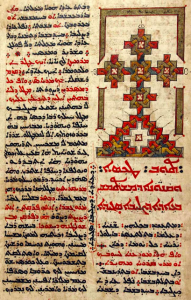
A page from a 17th-cent. Syriac lectionary.
See, it turns out that—while differences were not very numerous, and most were not very important theologically (with exceptions, like the Samaritan Torah’s injunction to worship on Mount Gerizim and not in Jerusalem)—the text of the Hebrew Bible wasn’t a settled matter in the first century. The famous Dead Sea Scrolls attest this: while they contain mystical and apocalyptic literature quite separate from the Bible, they include many manuscripts of many Biblical books, and it is plain from these documents that the portrait we painted of the Septuagint above needs some touching up. It isn’t (only) a matter of its translators making mistakes in their work; the Septuagint represents another Hebrew textual tradition, one distinct from the Masoretic.
Exactly how old or how good this tradition is, admittedly, is another question. For that matter, there are parts of the Hebrew Bible—especially in the section called the Ketuvim, I would assume—where the author may not have intended any one version to be final; compare this with the different versions of “The Rime of the Ancient Mariner” published by Coleridge in his lifetime. My understanding is that the academic jury is still out on those questions (though I’m not certain my reading is up-to-date in that respect). In any case, I’m intrigued to see how the field develops.
*Small, admittedly. I have never heard that they sank as low in numbers as two, so I assume they didn’t give this question any more thought than Hobbes did.
**No relation to the name “Desmond,” which is an Anglicized form of the native Irish Ó Deasmhumhnaigh, and yes, I am serious. (The main thing to learn here is that the Irish language hates you, personally.)
†However, they were recognized as variants on the open rounded vowel, o, one being the “short” version (probably much opener, less tense, and of briefer duration—maybe even higher in pitch) and the other the “long” version (almost certainly literally longer in duration, and likely to have been said with tenser lips or tongue); hence the names o mikron, “little ‘o’,” and ō mega, “big ‘Ō’.”
‡The dates during which the Masoretic Text was compiled are not precise, as it was not necessarily produced by a deliberate program. Generally, historians hold that it began at some point in the seventh century (when the Holy Land, and several other important regions formerly under Byzantine Roman control, passed into Muslim hands), and lasted until perhaps the end of the tenth—the earliest surviving copy of the Masoretic Text is from the early eleventh.
§Syriac is the name used for a set of varieties of Aramaic. The word Aramaic itself is a little more like “Romance” than, say, “French” or “Portuguese”; it indicates a closely- and messily-related web of dialects, neither clearly demarcated languages nor a single continuous mass. Syriac especially refers to the Aramaic that was spoken in and around Edessa, about a hundred and sixty miles inland (as the crow flies) from Antioch, from the second century or so forward. This variety of Aramaic became one of the Church’s principal liturgical languages, and is still used for that purpose in the Syro-Malabar and Syro-Malankara Churches of India, as well as by the Church of the East, which once had sees from Cyprus all the way to the coast of China.


